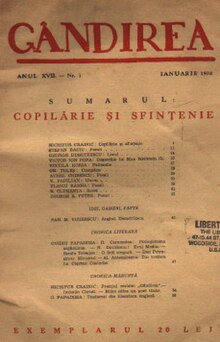Gândirea

Cover of Gândirea, 1938
|
|
| Categories | Literary magazine |
|---|---|
| Frequency | Monthly |
| First issue | May 1, 1921 |
| Final issue | 1944 |
| Country | Romania |
| Language | Romanian |
Gândirea ("The Thinking"), known during its early years as Gândirea Literară - Artistică - Socială ("The Literary - Artistic - Social Thinking"), was a Romanian literary, political and art magazine.
Founded by Cezar Petrescu and D. I. Cucu in the city of Cluj, and first issued on May 1, 1921 as a literary supplement for the Cluj-based Voinţa, it was originally a modernist and expressionist-influenced journal. During its early existence, it attracted criticism from the traditional cultural establishment for allegedly allowing influences from Germanic Europe to permeate Romanian culture. Gândirea moved to Bucharest in October 1922, and, in 1926, its leadership was joined by the nationalist thinker Nichifor Crainic; he became its director and ideological guide in 1928, gradually moving it toward a mystical Orthodox focus — itself occasionally referred to as Gândirism. With just two interruptions in publication (1925 and 1933–34), Gândirea became one of the most important cultural magazines of the Romanian interwar period.
A proponent of home-grown traditionalist ideas, it eventually found itself in opposition to Sburătorul, the modernist magazine headed by literary critic Eugen Lovinescu, as well as to the journal Viaţa Românească, which stood for the left-wing and agrarian current known as Poporanism. In its later years, Gândirea routinely hosted fascist-inspired and antisemitic articles, largely reflecting Crainic's own political views. By then, numerous disputes were taking place between Crainic's supporters and former Gândirea collaborators such as literary critic Tudor Vianu and poet Tudor Arghezi. Additional debates were carried between Crainic and the centrist political figures Nicolae Iorga and Constantin Rădulescu-Motru over the nature of nationalism and religion in Romania. The magazine often identified its secularist adversaries with materialism, and occasionally accused modernist figures in Romanian literature of writing pornography.
...
Wikipedia
